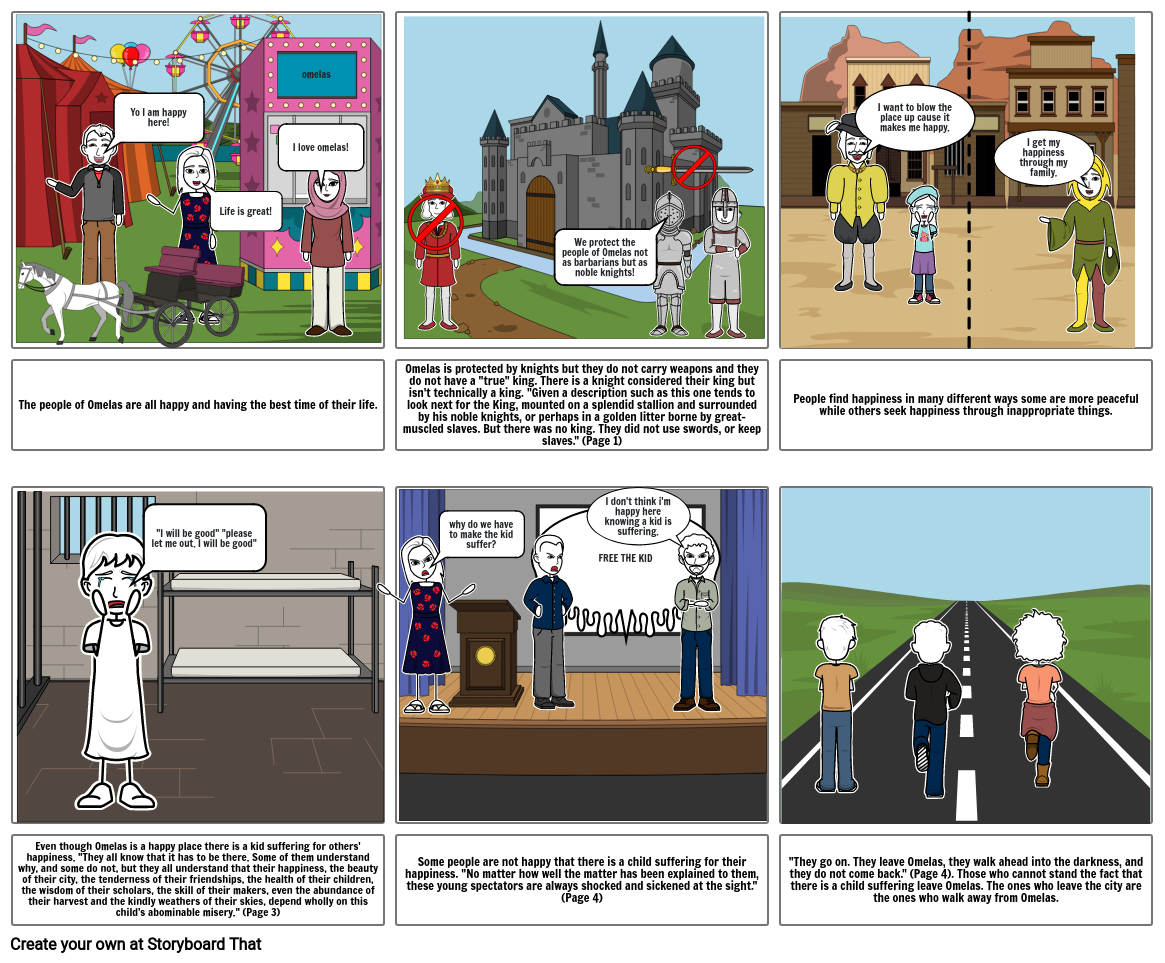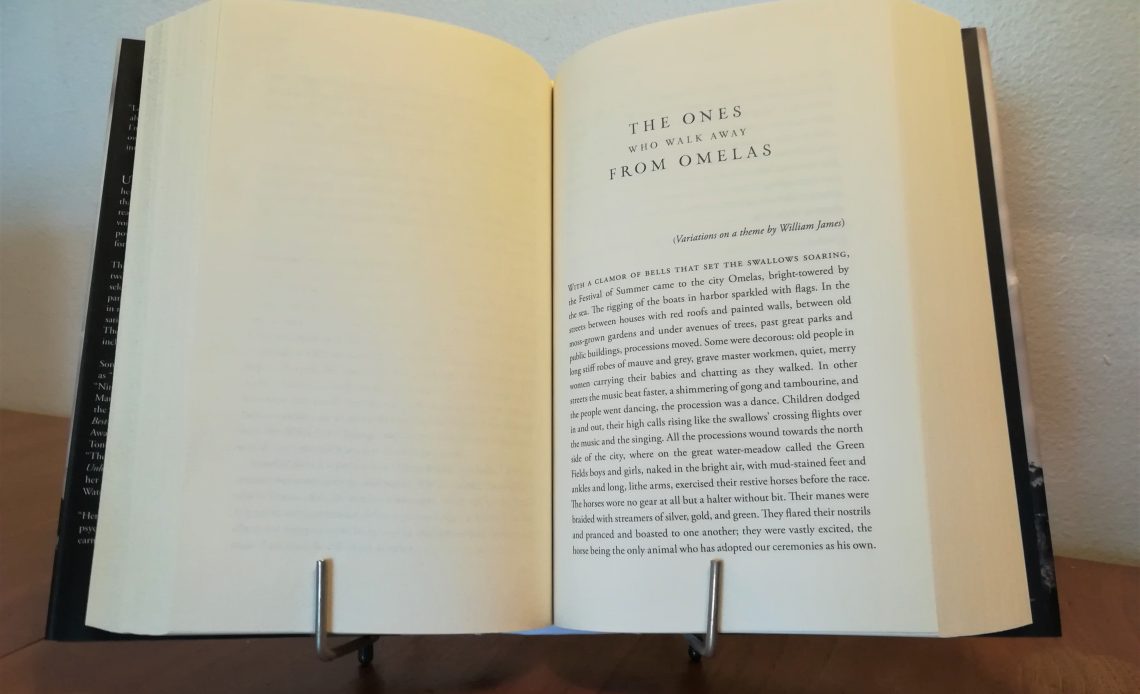Want to delve deeper into Theme Of The Ones Who Walk Away From Omelas? Read this article to gain broader knowledge.
In the whimsical city of Omelas, a hidden sorrow lurks at its core. Every year, a lone child endures unimaginable suffering, sustaining the idyllic existence of its citizens. This child’s misery serves as a silent guardian, a sacrifice upon which rests the city’s prosperity. Yet, there are those who, upon witnessing this grim truth, choose to flee Omelas, rejecting the tainted bliss it offers.

Theme Of The Ones Who Walk Away From Omelas
These enigmatic figures, known as “the ones who walk away from Omelas,” embody the profound moral dilemma posed by Ursula K. Le Guin’s poignant short story. Their decision to leave is not a mere act of escape but a testament to their unwavering compassion, their refusal to acquiesce to a society built on the suffering of others.
The City’s Secret: A Paradox of Happiness and Suffering
Omelas thrives upon a paradox: its citizens savor their joyous lives while being fully aware of the child’s torment. This knowledge casts a shadow over their revelry, a somber reminder of the sacrifice that sustains their idyllic world. To deny the child’s suffering would be to shatter the illusion of harmony that Omelas depends on.
The city’s elders, guardians of this dark secret, ensure that the child’s torment remains a taboo topic. Whispers of its existence circulate, but few dare to confront the truth. The citizens of Omelas have grown accustomed to their blissful ignorance, willing to turn a blind eye to the source of their prosperity.
The Torment of the Child: A Moral Imperative
The child’s suffering is not a mere abstraction but a stark reality borne by a single, innocent soul. Witnessing this torment firsthand exposes the true nature of Omelas: a society that prioritizes its own happiness above the well-being of its most vulnerable member.
For those who confront this horrific truth, it becomes an unbearable burden. They cannot in good conscience partake in the city’s festivities, knowing that their joy is stained with the tears of an innocent child. Compassion compels them to question the very fabric of Omelas, to challenge the notion that their happiness must come at the expense of another’s suffering.
The Choice to Walk Away: Embracing Compassion and Dissent
The decision to “walk away from Omelas” is not a simple act of abandonment but a profound rejection of the city’s moral code. It is a choice born out of empathy, a refusal to participate in a society that perpetuates injustice.
Those who leave Omelas do not seek absolution but rather an affirmation of their own humanity. They cannot bear the weight of complicity in a system that inflicts suffering on an innocent child. Their departure is a testament to the indomitable spirit of compassion, a beacon of hope amidst the darkness of Omelas.
Beyond Omelas: Echoes of our Own Moral Dilemmas
The allegory of “Omelas” resonates far beyond the confines of the story itself. It challenges us to confront our own complicity in systems that perpetuate injustice and inequality.
We may not witness blatant suffering on the scale of Omelas, but we are all faced with moral choices in our daily lives. Do we turn a blind eye to the struggles of those around us? Do we prioritize our own comfort and well-being above the rights and dignity of others? The choice to “walk away from Omelas” serves as a reminder that our actions, both big and small, can have profound implications for the world we live in.
Tips for Embracing Compassion in the Face of Suffering
Compassion is not innate but a skill that can be cultivated through practice and experience. Here are a few tips to help you embrace compassion in the face of suffering:
- Cultivate Empathy: Step into the shoes of those who suffer and try to understand their experiences and perspectives.
- Be an Active Listener: Allow others to share their stories and experiences without judgment or interruption.
- Offer Practical Help: Compassion is not just about feelings but also about tangible actions. Offer your time, resources, or support to those in need.
- Challenge Injustice: Speak up against systems and practices that perpetuate suffering and inequality.
FAQ on “The Ones Who Walk Away from Omelas”
- Q: What is the significance of the child’s suffering in Omelas?
A: The child’s suffering represents the moral paradox upon which Omelas is founded: the citizens’ happiness is built on the misery of an innocent child. - Q: Why do some people choose to leave Omelas?
A: Those who walk away from Omelas do so out of compassion and a refusal to participate in a society that perpetuates injustice. - Q: Is the decision to leave Omelas a selfish act?
A: No, the decision to leave Omelas is an act of selflessness and compassion. Those who leave reject their own comfort and well-being in order to stand up for what is right. - Q: What lesson can we learn from the allegory of “Omelas”?
A: The allegory of “Omelas” challenges us to confront our own complicity in systems that perpetuate injustice and to embrace compassion as a guiding principle in our lives.
Conclusion
The choice to “walk away from Omelas” is a powerful symbol of moral protest, a testament to the indomitable spirit of compassion. It challenges us to question our own values and priorities, to strive for a world where the happiness of one does not come at the expense of another.
Are you among those who would walk away from Omelas? Let your conscience guide your path, and may compassion be your guiding light.
Theme Of The Ones Who Walk Away From Omelas

Image: imaginatlas.ca
Thank you for visiting our website and taking the time to read Theme Of The Ones Who Walk Away From Omelas. We hope you find benefits from this article.